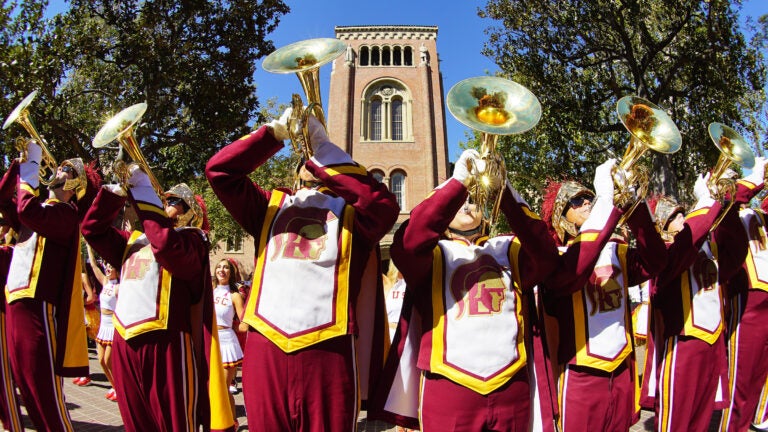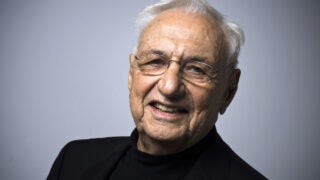
Band to celebrate 75th anniversary of ‘Conquest,’ anthem of victory for USC and agony for Trojans’ rivals
The daughter of the song’s composer will conduct the USC Trojan Marching Band and over 500 of its alumni during halftime on Saturday.
“A-woo, a-woo! A-woo, a-woo!” Generations of Trojans fans have come to associate the brassy mellophone fanfare of “Conquest” with Trojan victory as they rhythmically pump victory signs in the air.
This Saturday, the Spirit of Troy will celebrate the song’s 75th anniversary as USC’s victory march as part of the homecoming festivities. The majestic piece, an excerpt from the Alfred Newman score to the movie Captain from Castile, was adopted by the USC Trojan Marching Band in 1950 and has become famous (or infamous, if you’re an opponent) as the song that accompanies USC touchdowns and triumphs. Newman’s daughter Maria will conduct the USC Trojan Marching Band and over 500 of its alumni in a performance of the piece at halftime.
Seventy-five years ago, the season-opening football game was a somber one for USC. Former Trojans coach Sam Barry — who had passed six days before — and canine mascot George Tirebiter were memorialized with a moment of silence in a darkened Coliseum. Then, the band — led by director Clarence Sawhill and assistant Tommy Walker — marched down the peristyle wearing brand-new uniforms and, for the first time, headwear shaped like plumed Trojan helmets. The opening song for the season was “Conquest,” a piece Walker had received permission from Alfred Newman himself to perform.
Tommy Walker was the showman extraordinaire of the USC Band. Already famous as “Tommy the Toe” for kicking field goals for the football team while leading the band as student drum major, he brought spectacle and musical panache to the band as its assistant director and later director. He made “Conquest” one of USC’s signature songs.
“There have been other times when ‘Conquest’ seems to have sparked an ’SC team to victory,” Walker told the Daily Trojan in 1954. “During the recent Notre Dame football game, we were trailing and the band struck up the song. Immediately, the team marched down the field and went on to win. The number just seems to ‘do something’ to the players.”
‘Conquest’ takes off
“Conquest” was typically only played once or twice a game, the Daily Trojan noted. Walker did work it into halftime shows and even invited Newman out to a 1953 game to guest conduct his music at halftime. At the rainy 1955 Rose Bowl, Walker’s men made a splash marching out of the Rose Bowl tunnels dressed as mounted soldiers — white papier-mâché horse heads in front, tails in back — performing “Conquest” like a musical cavalry. The spectacle convinced Walt Disney, who was in attendance, to hire Walker as the first entertainment director of Disneyland, which opened later that year.
Throughout the decades, “Conquest” settled into the band’s repertoire as the closer to the pregame show, after USC victories, and to play Traveler around the Coliseum once per game. It was not performed after every touchdown until the early 1990s. After a down year for the football team, in which “Conquest” was only played three times for USC victories, then-director Arthur C. Bartner opted to play a shortened version of the march after every touchdown, a tradition that continues to this day.
Like its place in the band’s oeuvre, the song “Conquest” has evolved over the decades. It was originally arranged for the band by student librarian J. Durward Morsch. It was later revised by USC composition professor Robert Linn and the band’s longtime arranger Tony Fox. Some of the major alterations to the song’s structure, however, were made by the band’s musicians themselves. The trombones taking the lead from the trumpets in the bridge is credited to a suggestion by Ken Dye, now the band director of the University of Notre Dame. And the now-characteristic “horn calls” — the “a-woo, a-woo” part — that punctuate the recapitulation of the main theme at the song’s climax were added later that decade by Richard Todd, who later contributed to over a thousand movie soundtracks on French horn.
“’Conquest’ really is a reflection of the students involved in the program,” current Trojan Marching Band director Jacob Vogel says. “The truth is, you cannot find in the film a part of this piece that sounds exactly like our version. It’s been morphed and tweaked over time.”
The soul of ‘Conquest’
The bold, stirring soul of “Conquest,” however, lies in the original work by Alfred Newman. A cue from his score to the 1947 Tyrone Power epic Captain from Castile, the piece punctuates scenes depicting Spanish conquistadors marching through Mexico, most memorably in the closing sequence where Cortés leads his troops toward confrontation with Moctezuma. The march, with its interplay of horn flourishes and sweeping strings, is distinctively Newman.
“In movies like Captain from Castile, and later How the West Was Won, he developed this sort of brassy kind of American style,” says composer and conductor David Newman, Alfred Newman’s son. “Most of his kind of brassy, heroic music has a tinge of American sensibility in it. He was the only person that was born in America that was of that first generation [of film composers].”
Born at the turn of the 20th century, Newman was brought west from Broadway by Irving Berlin in 1930 just as “talkies” were revolutionizing the movie business. He is now considered one of the forefathers of film scoring, both for his unabashedly romantic soundtracks and the “Newman system” of film music recording that helps the conductor and orchestra stay precisely in sync with the moving images. It’s a technique still used today in film scoring.
Alfred Newman, along with his brother Lionel and Emil, launched a musical dynasty that continues to this day, including David, Thomas, Randy and Maria — all accomplished composers, conductors and musicians. Together, the Newman family has over 90 Oscar nominations.
Ever since USC adopted “Conquest,” the Newman family has maintained a close connection with the university. David and Thomas both attended the USC Thornton School of Music and Newman’s widow, Martha, gave the funds to name the on-campus Alfred Newman Recital Hall and donated his papers and original scores to the USC School of Cinematic Arts.
Alfred’s youngest child, Maria, will honor her father’s legacy at halftime of the homecoming game, conducting the full USC Trojan Marching Band and over 500 returning alumni. Maria is a celebrated violinist, violist, pianist and — like her father — composer. She has written numerous classical compositions and has been commissioned to write modern scores for classic silent films.
“USC honored my father’s musical greatness and forged it into the mighty fabric of their own identity,” Maria Newman says. “This had a ripple effect on my mother’s love and appreciation of USC. For me, conducting ‘Conquest’ — leading this stellar group of exceptional students and alumni — is a dream personified. His music enables me to know him, not only in the abstract, but nearly tangibly: to feel the spirit-rousing sonorities that he surely felt when conducting the piece himself.”
The USC homecoming game kicks off at 12:30 p.m. at the Los Angeles Memorial Coliseum, with halftime beginning at approximately 2 p.m.



